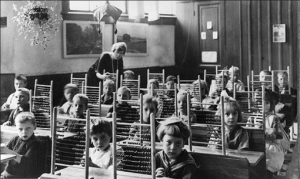News from Digital Learning

It is often tempting as a parent to think back to your own schooldays when imagining your daughter’s daily life in today’s classrooms. It is time to rethink everything you know about what school was like when you were a child if you want to visualise the daily experiences of schoolchildren in 2017. The impact of technology on modern schooling is indisputable. If you stop to consider the emergence of official School policies surrounding high-tech concerns like smartphone usage, cyberbullying and social networks, it becomes obvious that the rules today are different.
It is a brave, new world out there, but despite the much-publicised dangers that technology reportedly poses to today’s youth (often unaccompanied by balanced discussion of their equally meaningful upsides), it pays to remember that digital learning is a key concept that needs to be embraced by educators in today’s classrooms. However, it is also worth noting that definitions of high-tech, online and distance learning solutions often differ between school and university campuses. For example, digital learning could refer to the use of tablets or laptops in the classroom. It could mean using online sites, services and programs as teaching tools, or as study aids built for at-home use. Alternately, it could refer to the practice of using apps, social networks and communications platforms as tools to create your own digital assignments and agendas.
Bearing this in mind, the possibilities when it comes to digital and distance learning are almost endless. Regardless of the definition, for Schools such as St Catherine’s, seeking ways to empower and get the most out of our students, there are five main reasons why digital learning is so important in the 21st Century education of tomorrow’s adults.
Personalisation
Digital learning offers us an unprecedented ability to provide educational experiences that are tailor-made for each student. As pupils advance in programs on English, Mathematics, Science, History, the Arts and their other subjects, teachers can now track their individual progress, identify specific areas of focus for each student with actual data to back it up, and present solutions that address their specific needs. Students thrive most in situations where the educational experience has been tailored to their own unique needs, and digital technologies provide teachers with the tools and opportunity to do this.
Accessibility
By embracing digital devices and connected learning, classrooms around the globe can connect to one another to share insights and boost learning, experience and communications skills. Furthermore, students can access their classroom materials online using the mystcatherines portal, download the content from lessons that they missed and submit work online. As parents, you can access the feedback, marks and comments for your daughter’s assessment tasks as they are marked by their teachers. Details are also available online about the many co-curricular programs and clubs that St Catherine’s offers.
Cultural Relevance
Nearly every aspect of the real world has gone digital, including fields such as manufacturing, science and medicine as well as industries such as art and entertainment. Employers are increasingly turning to interactive training tools to boost engagement, learning and retention. Even before students enter the workforce, any college experience involves the use of an array of technological devices and connections. The inclusion of digital learning in classrooms from Prep to Year 12 prepares students for the reality of tertiary education and the modern workplace.
Efficiency
Digital learning solutions also bring to bear a number of key efficiencies, both real and virtual, that cannot be matched by traditional learning techniques. Whether it is the environmental impact recognised by the need for less paper for handouts and books or the time savings provided by pupils’ unprecedented access to information and ease of research. Digital learning provides an effective way to maximise our resources and ensure that students are efficiently and easily provided with the learning resources and communication that they need.
Performance
Studies have shown that students using technology as an education tool often become more engaged in the process and more interested in growing their knowledge base — in some cases, to the point that they do not even realise they are actively learning. Likewise, research has demonstrated that well designed interactive teaching resources can boost test scores, being more engaging and memorable than the traditional textbook. Online and high-tech programs not only often provide better context, a greater sense of perspective, and more arresting activities that allow them to better connect with students, they also frequently offer a more interesting and involving way to digest information and allow students to revisit content if they did not completely understand.
At St Catherine’s we are committed to using Digital Technologies as an integrated part of the classroom experience, whilst recognising that the technology itself is not the answer, but that its usage as a modern teaching tool can have an important positive impact on the way that our students learn. We have also embraced the idea that this is not a static space, the technologies we include in our classes are constantly improving and evolving, and our classes and programs reflect this. This is clearly demonstrated by the ever-changing nature of the ways in which we embed digital learning into our classrooms and by the provision of groundbreaking programs such at the introduction of our Year 9 and 10 Virtual and Augmented World elective, which investigates the newly emerging technology of Virtual and Augmented Reality in Semester 2.
The renowned American educationalist John Dewey, famously commented on his influential 1915 book ‘Schools of Tomorrow’ stating:
“If we teach today’s students as we taught yesterday’s, we rob them of tomorrow.”
This is even more true today than it was a century ago.



